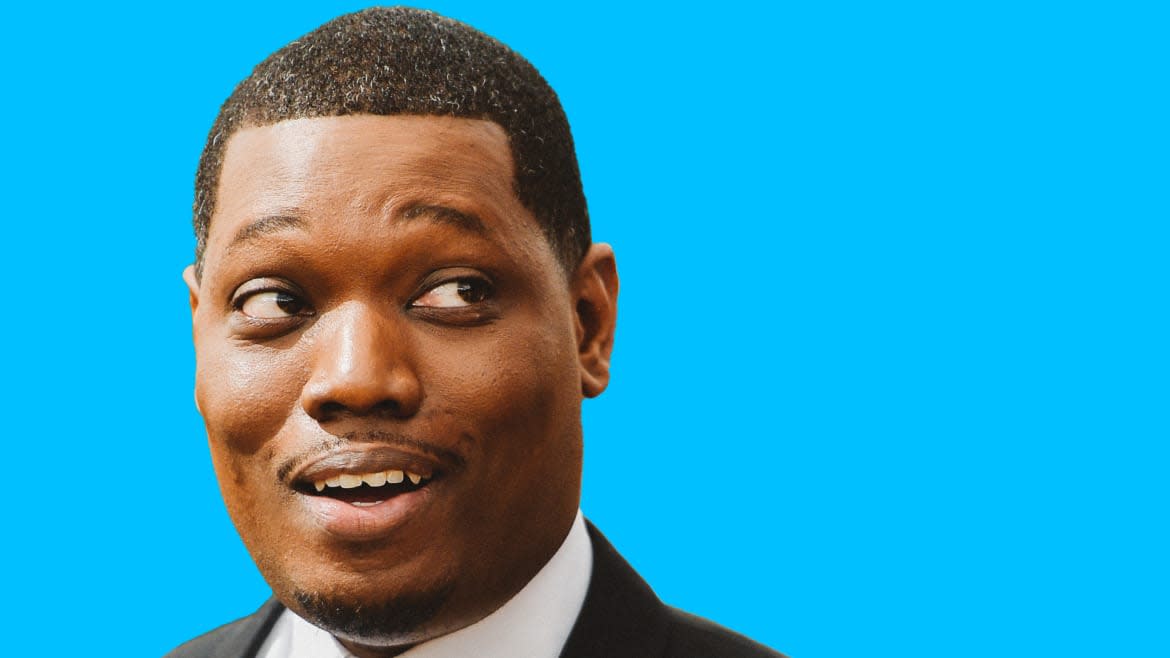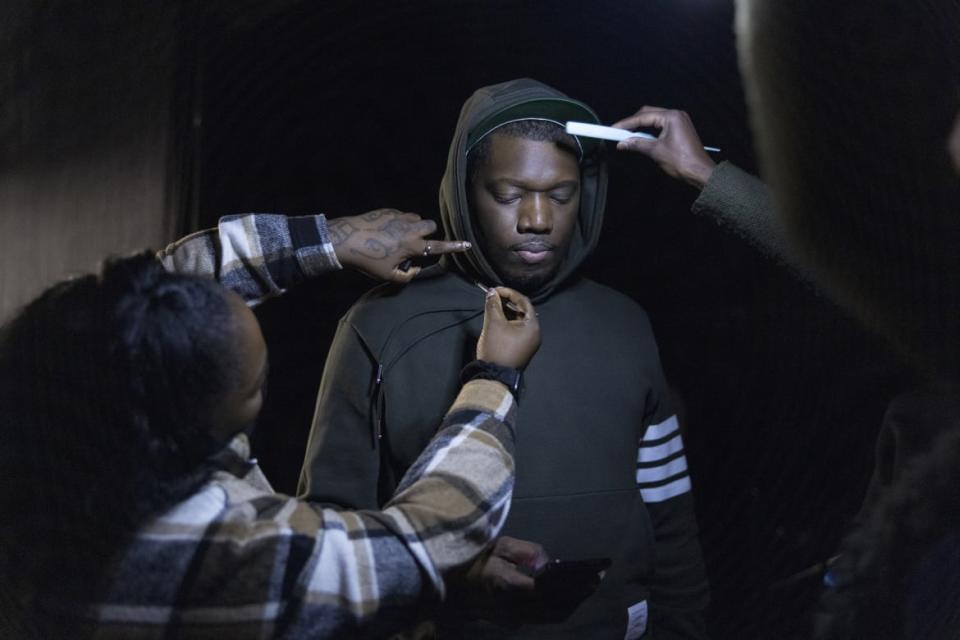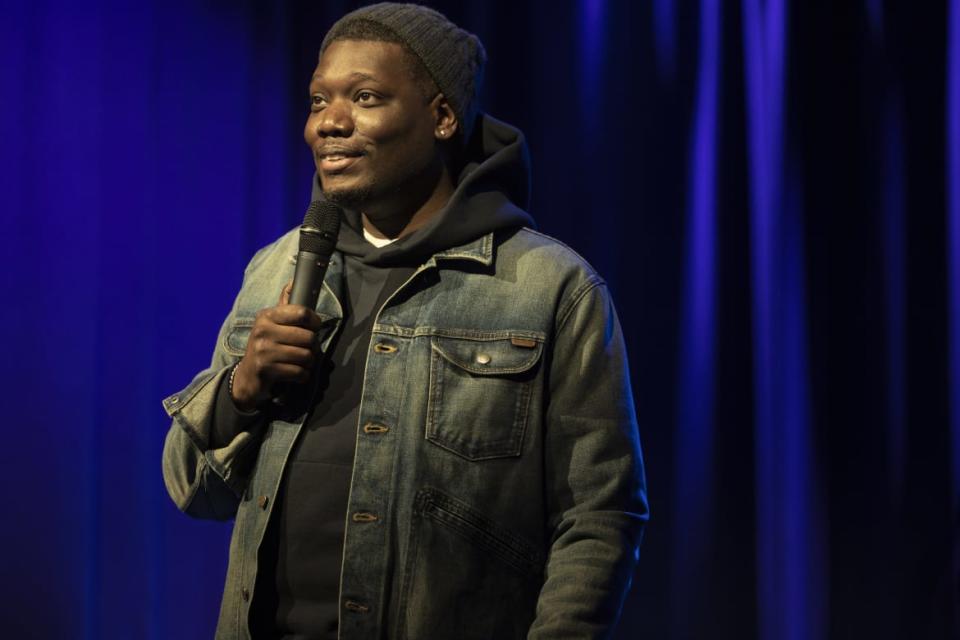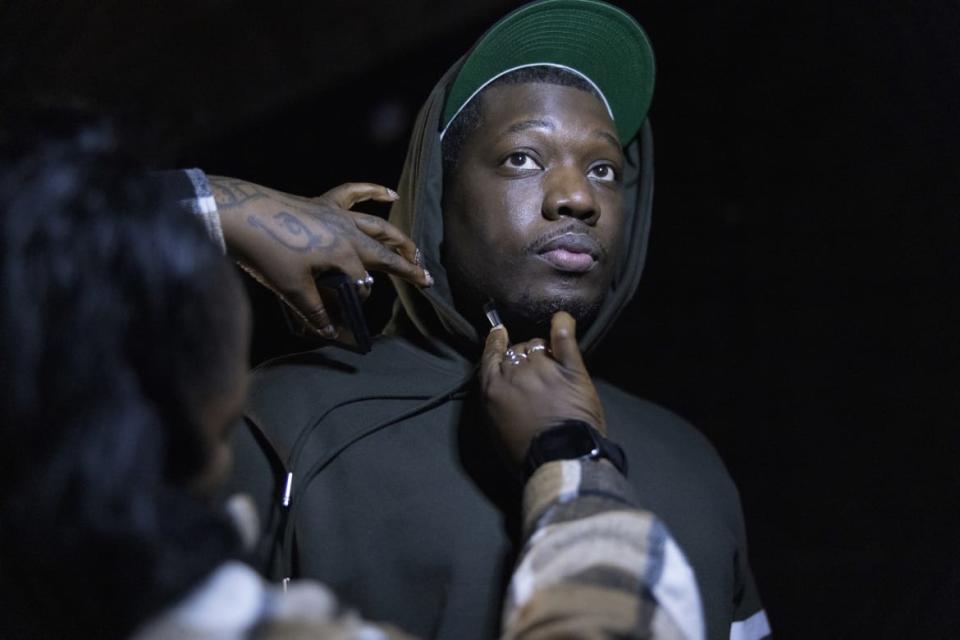Michael Che Is Tired of You Messaging Him About Che Diaz

- Oops!Something went wrong.Please try again later.
- Oops!Something went wrong.Please try again later.
“Not bad for somebody who hates the media, right?” offers a chuckling Michael Che.
He jests, of course, though Che is keenly aware of his reputation when it comes to the media, owing to his propensity for retaliating against his critics via Instagram Stories, broadcasting retaliatory broadsides—occasionally in the form of personal attacks—to his 750K followers. In this way, he is perhaps comedy’s Kevin Durant, an immense talent whose social-media reactivity feels at odds with their elevated stature.
About that stature: Che is not only a comedy superstar, but a trailblazer. He became the first non-white host of Saturday Night Live’s Weekend Update in 2014 (a position he shares with Colin Jost), and is the show’s only non-white head writer in its 47-year history, a perch formerly occupied by the likes of Adam McKay, Tina Fey, and Seth Meyers. He’s co-hosted the Emmys (winning two of them), released three stand-up specials, and even popped up on Sesame Street.
A chipper and affable Che has hopped on the phone with me—along with an assistant and a publicist listening in—to discuss the second season of That Damn Michael Che, a sketch-comedy series in the vein of Chappelle’s Show tackling topics like TikTok dances, medical discrimination, social-thriller films, and his own celebrity with heavy doses of wit and agile humor. Whereas the first season of the HBO Max offering felt at times untidy and unfocused—and much of its policing humor failed to land—its second outing brims with confidence and its vision is crystal-clear, juxtaposing sharply written sketches with flashes of Che’s stand-up musings.
“Hey, white women: Stop calling Black women your ‘spirit animal.’ That shit sounds fucked up,” he observes, before segueing to a scene of two wound-up women in a market—one white, one Black—staging a racist altercation on IG Live with ring lights.
See Amy Schumer and David Letterman’s Favorite Rising Comics
For the 39-year-old Che, it’s an opportunity to craft jokes specifically for his own audience, as opposed to watering down some of his material to satisfy the SNL masses.
“It’s not my show, you know?” he says. “I always feel like there are certain kinds of rules and parameters I have for SNL. I don’t like to get too personal on the show. I try to keep things on an island, and I try to keep in mind that this real estate is not just mine—it’s also for the good of the show, and for the progress of the show. I’m doing that job. It’s easier to do that part of it when I can do stand-up and do my own projects and be a lot more specific and a lot more selfish.”
You seemed far more confident during the second season of That Damn Michael Che, and it was evident in the way you staggered your punchlines/payoffs, which struck me as more layered than the first outing. Did you feel like you were working out some kinks in Season 1?
Well, first of all, thank you. I appreciate that. The second season, I feel like—meaning everyone who worked on the show—this was the show we were trying to do but didn’t really find until later. We found it toward the last episode of the first season, and then thought, OK, now we know exactly what we want to do. A lot of Season 1 was kind of written backward, because we had miscommunications with production and the directors, so we had to almost salvage the season. By the time the second season started, we knew exactly what we wanted it to be, and it was a lot easier to get right.
I enjoyed the “Scared Straight” bit from Season 2 because I grew up watching that shit and people don’t talk enough about just how crazy it was to have that broadcast completely uncensored on television. I still vividly remember the “hold my pocket” sequence.
[Laughs] I remember they did it in the ’70s, and then did it again in the ’90s for my generation when I was a kid. And then on daytime television, like with Maury Povich and those kinds of shows, they had their version of taking kids to prison and showing them wild stuff. It was kind of weird! But I do think that in this context, seeing the gun violence that’s happening with kids so young, it’d be harder to scare them straight.

The whole Roc Nation Brunch episode was a standout. Where did you find that Jay-Z-as-Basquiat wig and what was it like to wear that around? Seeing you in that cracked me up.
We kind of had to call a ringer at SNL, and Jodi [Mancuso] hooked me up. Even I didn’t think it would be as good as it was, and then when the look came out it was really funny just walking around like that and having to be around your friends. When people see you like that outside or on set and they can’t hold it together, it’s a good indication of what the audience will feel when they see it. It was always fun to do that first reveal. Sometimes you’d just look over and catch someone staring at you and shaking their head. It was a lot of fun. People were like, what is happening?
You’ve said that with That Damn Michael Che you wanted to make content for a Black audience. I’m curious how you’ve balanced writing on SNL, which by comparison has a predominately white audience, with your own comedic sensibilities? Because you call back to that tension in the finale of Season 2.
I think it’s not necessarily writing for a Black audience. Whatever I write is gonna be Black because I’m Black. I think it’s more not having to cater it to an audience that doesn’t understand my experience—in the same way that stand-up does. There’s a lot of filtering that happens when you’re trying to translate why you think something is funny to make it palatable for a broader audience. This show is an opportunity for me to just state why it’s funny plainly, and make the reference plainly, and use the examples of the way I would say it to my friends—and the way we would say it together without anybody listening. It’s written for a Black audience because I wrote it and it’s not rewritten for a mainstream audience, if that makes sense.
Yeah, I think so. I’ve seen your social-media posts about the character of Che Diaz—including you sharing the recent Variety cover story—and I’m curious how strange it’s been for you to share a name with arguably the most grating character on television.
You know what’s crazy about that? I’ve never, ever, ever seen Sex and the City or the new reboot, so I have no idea what or who [it is]. Every time there’s a Che Diaz thing, I get so many messages of people like, “This you?” “This you?!” and I’m like, “I don’t know who this person is!” People have told me since that the character’s pretty polarizing, apparently, and does comedy, and is on the same network that I’m on. But for me, I like to post it so that people stop sending it to me. It’s my way of saying, “OK, you saw it!”
I read that your name Che came from Che Guevara. I have a somewhat unique name too, and I know it’s not your first name, but have you thought at all about how being given that name has potentially shaped your personality or your path?
Well, my dad was who named me after Che Guevara. He is a big history buff and loves revolutionaries. He’s always saying, “You know, you were born on the same day as Malcolm X.” He’s sees the symbolism a little bit more than I do. I guess he is my dad, so there’s some of him in me in some way, but I’m not super into Che [Guevara] and it’s very polarizing. Depending on what side of Cuba you’re on, you may hear an earful saying you were named after Che, so I try to kind of keep it quiet. But for my generation, those Che T-shirts and Che posters were a symbol of rebellion. Rage Against the Machine used it, and it was the iconography of a first-week revolutionary, you know?
That kid in the suburbs listening to Rage Against the Machine and wearing a Che Guevara T-shirt.
[Laughs] Yeah, exactly. And that’s right up my alley, because Rage Against the Machine was when I was a teenager, so that’s when I would’ve thought it was exciting and cool. But the older I get I realize you just are who you are, ain’t shit in a name, and you are what you do.
I enjoyed the comedy podcasting bit in Season 2 of That Damn where you have cops getting people to confess by sitting them down for a podcast. It reminded me of the Key & Peele bit where the cops use rappers’ lyrics against them, and I wanted to ask how you feel about comedy podcasting culture. It’s been said that on social media, all journalists want to be comedians and all comedians want to be journalists. And now we’re seeing comedians on these podcasts act like pundits, weighing in on all the hot topics.
That is so funny you say that. I was at an afterparty and met Don Lemon, and he stopped me. He said to me—among other things, he’s very nice—“Man, I want to do what you guys do,” which was horrifying. I was like, “No, man! You gotta do news. You’re doing the important stuff, we’re making fun of you—that’s a lot less necessary. The world doesn’t need more jokes!” I do think there is something to that—something sexier about the other side of the fence—but not with me. I want nothing to do with journalism or that career.
It seems like Bill Maher and Jon Stewart—whose show you were on briefly—are largely responsible for this melding of comedy and punditry, and now you’re seeing a lot of people go that route as far as podcasting goes.
What happens is, there’s one or two geniuses who figure out how to do it great, they do it so great that they make it look easy, and then everybody wants to do it. What made it cool for Jon Stewart makes it almost obnoxious when anyone else tries anymore.
That reminds me of your Jordan Peele sketch in Season 2 of That Damn, because we’ve seen so many shitty Jordan Peele knockoffs in the wake of Get Out.
[Laughs] So many people have tried their hand at Black social horror and it’s like, just let the motherfucker have his space, OK? We don’t all have to do one now!

To go back to the comedy-podcasting thing, the sketch reminded me a bit of the Shane Gillis situation at SNL, where he was announced as a cast member and then almost immediately fired for some racist jokes he’d made on a podcast. How do you feel that situation was handled?
How the Shane Gillis situation was handled? By who?
By SNL.
I don’t know, man. That’s a tough predicament. I hate offering criticism where I have no better solution, do you know what I mean? It wasn’t in my hands to make that decision. I think Lorne [Michaels] and Shane had come to a place where they figured out what was best for each other. That’s not a decision that I would’ve wanted to have to make. That’s a tricky situation.
It seems like there’s not enough vetting done when it comes to casting people on shows. It’s like on The Bachelor or something, where you’re midway through a season and then people find some racist photos on their Instagram and it becomes a big ol’ mess.
Yeah. I’m never in the position of what the punishment should be, or what the action should be. For me, I think you can confront, and joke, and get through anything with conversation and confrontation, but I’m also not known for my ability to put out fires. [Laughs]
In Season 2 of That Damn you at one point refer to Kanye as “special needs.” Was that payback for Pete [Davidson]? Because it must have been surreal to have Kanye go after one of your colleagues like that on social media during the SNL season—and then somehow rope you into it, offering to double your salary if you left the show.
Absolutely not. It was actually done before any of that—but also, that definitely wasn’t said in a malicious way. It was done in a genuinely questioning way of, “Where does this canceling go? Can you cancel somebody because they’re going through something, or struggling through something, and they have a condition?” I don’t know. When does compassion step in when somebody is behaving in a way that they’ve told you they’re already predisposed to behave? I genuinely don’t know. But I think that’s what makes it funny. Sometimes jokes aren’t funny because you’re making fun of something or attacking it. Even the questioning—and not knowing the correct answer—is funny. Sometimes we genuinely don’t know. It’s a weird conundrum: How much stock can we put in someone’s behavior when we know they have behavioral problems?
To go back to my original question for a sec: How surreal was it to be roped into that whole mess? I mean, you had a billionaire posting all these Instagram memes about your colleague and then roping you into it.
Nah, I don’t trust all of that, man. To me, he’s still a man—he’s still a person—and he’s still going through all the things we go through. I don’t look at celebrity that way. It doesn’t seem that bizarre to me. I think the bizarre thing is the way we handle it and think about people based on what they have, and how much we envy what they have, as opposed to what they’re actually going through.
I’m of course a member of the media, and I think you’ve shown a certain degree of hostility toward the media as far as criticism of you goes. You went after Craig Jenkins at Vulture, who’s a Pulitzer Prize-finalist critic and someone I admire. He gave a somewhat mixed review of the first season of That Damn Michael Che and then you went after him. I wanted to ask you how you would characterize your relationship with the media and your ability to take criticism? And do you feel like it’s evolved at all?
I have an issue with people that say I can’t take criticism. I always hear people say that, and what better way to take it than to talk about it. I think people say “take criticism” meaning, “We should be able to say whatever we want and you’re not supposed to respond,” or something? I just genuinely don’t know what that means, to “take criticism.”
I think Craig’s piece was a rather measured, well-written review of the first season of That Damn Michael Che that wasn’t done maliciously, and then you went right into attacking him.
I didn’t think it was malicious at all. I actually thought it was a good piece.
OK, maybe this is more about your relationship with social media then.
I think that people who like to write articles—or maybe there’s a culture of writing articles or writing criticism and either A) not having the artist say anything back, or B) they like to make a bigger deal of when an artist does say something back. I don’t know. I just find it strange. It’s like, it’s criticism when you do it, but when I criticize you it’s hostile and I can’t take criticism. It’s this weird mental gymnastics. Like, right now, you’re asking me a question and I’m answering it, and I feel like reviews are like that too, or articles are like that too, where they may ask a question—this choice was made—and then when an artist speaks out and says, “Well, actually, that’s not what it’s about,” then it’s like, “That guy is supposed to just take the criticism.” And I’m like, well, no, I can communicate! If you Google my show, this thing will be accompanied by it, and I should be able to offer a rebuttal to what somebody’s writing—especially if I believe it to be unfair—but it’s not coming from any hostility.

I think you should be afforded the right to rebut any criticism you think is unfair, but—
—I think so too! I think that journalists, bloggers, and media people—I wish they were a little more responsible in the context of the words they use, because if you frame somebody’s written words in the context of “hostile,” “can’t take criticism,” or “combative,” it changes the context of how something is actually being presented. So, I can say something jokingly and then it’s rewritten as this angry thing, and it’s kind of not fair, but also part of the game. We all got to pay our taxes, I guess.
I totally defend your right to rebut any criticism that you think is unfair. In the case of Craig though, it got personal. If you had said, “I don’t agree with your criticism of the show and here’s why,” I think that would be totally cool and people wouldn’t have a problem with it. But it went to a place of—
—Oh! I don’t think I had a problem with the review. What I had a problem with—it wasn’t even a problem; it was just an observation—is that… I don’t really want to get into it too much, but I do think there is a practice where they get people to write certain things based on what they can get away with and the optics of it. I think a lot of media places are very conscious of the optics of reviews, and I think that they chose wisely. I thought it was actually hilarious and I wasn’t upset at all, because I didn’t think the review is bad. But that keeps coming up. I kind of forgot the guy’s name. I remember it was Craig-something. I thought it was funny. If there’s anything that you’ll keep from this conversation, just know that if I’m posting about something, it’s in jest. I’m a fucking comedian. It’s poking fun—it’s not angry. It’s sexier to say, oh, this guy is so mad! But that’s genuinely not the case. I could not care less about what Craig thinks.

OK, so I’m sure you get bugged about this ad nauseam, but I gotta add to the chorus and ask what your future is when it comes to SNL. You’ve released hit stand-up specials and That Damn Michael Che Season 2 is excellent, so you’ve clearly got your feet in other things. How much longer do you feel you’ll be able to keep being co-head writer of SNL eight months a year, and do you think you’re close to the point where you want to pursue other things?
I mean, I do want to pursue other things, and we’re working on it now where I’ll maybe be able to and we’ll see how this year goes. As other projects take off, I’ll have less and less time to do that show, but I always love working at SNL. I always love working with Lorne, I love working with the cast, and I think it’s the hardest possible show to put together on television—and it’s not even close. And I do love the excitement of the show and the interest that the show generates even still—and even in our worst years, which I’ve been a part of. [Laughs] People still care about the show, people still follow the show, people still track the show. It means something to people, you know? Even if you don’t like it, you want it to be good again; or, if you love it, you want it to stay intact. I love being a part of that and respect the hell out of it, but I can’t give it all of the time that I once did, and I do think at some point there’ll come a time where it’s more interesting to see someone else up there. I don’t want to hijack the seat just because I can.
It does seem like there’s a changing of the guard right now, with Kate [McKinnon], Aidy [Bryant], Pete [Davidson], and Kyle [Mooney] leaving. This is a weird transitional phase, so how optimistic are you about the younger cast members filling in those gaps?
First of all, I’m not just giving you the corporate answer, but we have already such a large cast, and I do think this cast is an all-timer cast that may not be appreciated for what it is in the moment. Most casts rarely are, but I do think in hindsight people will see how much talent is actually here, and there will be more of an appreciation when they’re gone. Obviously, Kate, Aidy, Kyle, and Pete are extremely valuable and added so much to the show, but there’s still tons of stuff we’ll be able to see from other people. There have been parts of the season where we didn’t have Kate or didn’t have Pete and it gave a lot of people the opportunity to be on more, and I think that’s why this show can last for 47 years, because it’s able to replenish itself. There are so many voices—Please Don’t Destroy, Heidi [Gardner], Ego [Nwodim], Bowen [Yang]. There’s a lot of talent there. You’ve got Sarah [Sherman], Chris [Redd]. And Kenan’s still there! If it’s just Kenan, we’ll be fine. Even if it’s 95 percent Kenan on camera, we’ll be all right. It’s actually kind of exciting. There’s no other show where you can lose your four biggest stars—or four pillars—and be able to go on.
Get the Daily Beast's biggest scoops and scandals delivered right to your inbox. Sign up now.
Stay informed and gain unlimited access to the Daily Beast's unmatched reporting. Subscribe now.

